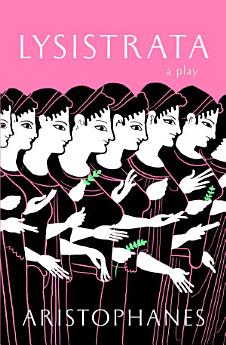Lysistrata: A Play
মাৰ্চ ২০২০ · Open Road Media
ইবুক
96
পৃষ্ঠা
family_home
যোগ্য
info
reportমূল্যাংকন আৰু পৰ্যালোচনা সত্যাপন কৰা হোৱা নাই অধিক জানক
এই ইবুকখনৰ বিষয়ে
Considered the Greek playwright’s greatest work: “A bawdy antiwar comedy [about] one woman’s extraordinary mission to end the Peloponnesian War” (Classical Literature).
First presented in 411 BC, Lysistrata is one of the great works from the classical age of drama. It is the third and concluding play in Aristophanes’s War and Peace series and portrays a humorous battle of the sexes.
In the twenty-first year of the Peloponnesian War, desperate times call for desperate measures. Angry at being ignored in matters of state and tired of missing their husbands, the women of Athens—led by Lysistrata—refuse to have sex with their men until they put down their weapons.
“The reason for its enduring appeal is simple: sex and politics. The eponymous heroine and her militant sisterhood take two actions to make their men stop fighting: first, they stage a sex strike—the withdrawal of sexual favors until peace is declared; second, they occupy the Acropolis, freezing the funds necessary to keep the war going . . . Lysistrata has a serious story to tell. But like all good comedies, it knows when to stop taking itself too seriously.” —Blake Morrison, The Guardian
First presented in 411 BC, Lysistrata is one of the great works from the classical age of drama. It is the third and concluding play in Aristophanes’s War and Peace series and portrays a humorous battle of the sexes.
In the twenty-first year of the Peloponnesian War, desperate times call for desperate measures. Angry at being ignored in matters of state and tired of missing their husbands, the women of Athens—led by Lysistrata—refuse to have sex with their men until they put down their weapons.
“The reason for its enduring appeal is simple: sex and politics. The eponymous heroine and her militant sisterhood take two actions to make their men stop fighting: first, they stage a sex strike—the withdrawal of sexual favors until peace is declared; second, they occupy the Acropolis, freezing the funds necessary to keep the war going . . . Lysistrata has a serious story to tell. But like all good comedies, it knows when to stop taking itself too seriously.” —Blake Morrison, The Guardian
লিখকৰ বিষয়ে
Aristophanes, son of Philippus, of the deme Kydathenaion, was a comic playwright of ancient Athens and a poet of Old Attic Comedy. Eleven of his forty plays survive virtually complete.
এই ইবুকখনক মূল্যাংকন কৰক
আমাক আপোনাৰ মতামত জনাওক।
পঢ়াৰ নির্দেশাৱলী
স্মাৰ্টফ’ন আৰু টেবলেট
Android আৰু iPad/iPhoneৰ বাবে Google Play Books এপটো ইনষ্টল কৰক। ই স্বয়ংক্রিয়ভাৱে আপোনাৰ একাউণ্টৰ সৈতে ছিংক হয় আৰু আপুনি য'তে নাথাকক ত'তেই কোনো অডিঅ'বুক অনলাইন বা অফলাইনত শুনিবলৈ সুবিধা দিয়ে।
লেপটপ আৰু কম্পিউটাৰ
আপুনি কম্পিউটাৰৰ ৱেব ব্রাউজাৰ ব্যৱহাৰ কৰি Google Playত কিনা অডিঅ'বুকসমূহ শুনিব পাৰে।
ই-ৰীডাৰ আৰু অন্য ডিভাইচ
Kobo eReadersৰ দৰে ই-চিয়াঁহীৰ ডিভাইচসমূহত পঢ়িবলৈ, আপুনি এটা ফাইল ডাউনল’ড কৰি সেইটো আপোনাৰ ডিভাইচলৈ স্থানান্তৰণ কৰিব লাগিব। সমৰ্থিত ই-ৰিডাৰলৈ ফাইলটো কেনেকৈ স্থানান্তৰ কৰিব জানিবলৈ সহায় কেন্দ্ৰত থকা সবিশেষ নিৰ্দেশাৱলী চাওক।








